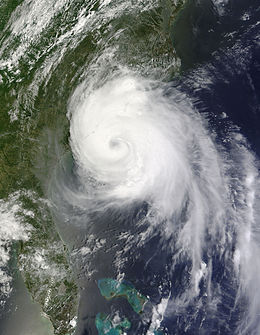Hurricane Arthur
| Category 2 hurricane (SSHWS/NWS) | |

Hurricane Arthur intensifying south of North Carolina on July 3
|
|
| Formed | July 1, 2014 |
|---|---|
| Dissipated | July 9, 2014 |
| (Extratropical after July 5) | |
| Highest winds |
1-minute sustained: 100 mph (155 km/h) |
| Lowest pressure | 973 mbar (hPa); 28.73 inHg |
| Fatalities | 1 direct, 1 indirect |
| Damage | At least $22.7 million (2014 USD) |
| Areas affected | |
| Part of the 2014 Atlantic hurricane season | |
Hurricane Arthur was the earliest known hurricane to make landfall in the U.S. state of North Carolina, and the first hurricane to make landfall in the United States since Hurricane Isaac in 2012. The first named storm of the 2014 Atlantic hurricane season, Arthur developed from an initially non-tropical area of low pressure over the Southeastern United States that emerged into the western Atlantic Ocean on June 28. After sufficiently organizing, developing a well-defined circulation and deep convection amid a favorable environment, it was classified a tropical depression on July 1. The system continued to strengthen, and was declared a tropical storm later that day. Drifting northward, the storm reached hurricane status early on July 3 and curved toward the north-northeast. Further structural organization resulted in additional intensification, and by 01:00 UTC on July 4, the system attained its peak winds of 100 mph (160 km/h) as a Category 2 hurricane on the Saffir–Simpson hurricane wind scale. Arthur made landfall at 03:15 UTC over North Carolina's Shackleford Banks, positioned between Cape Lookout and Beaufort, and intensified slightly further, with a minimum atmospheric pressure of 973 mbar (hPa; 28.70 inHg). The storm then trekked swiftly northeast, weakening as it passed by Cape Cod and Nantucket, before transitioning into an extratropical cyclone and coming ashore at Weymouth, Nova Scotia, on July 5. The remnants continued generally northeastward through Atlantic Canada before ultimately dissipating on July 9 over the Labrador Sea.
...
Wikipedia
